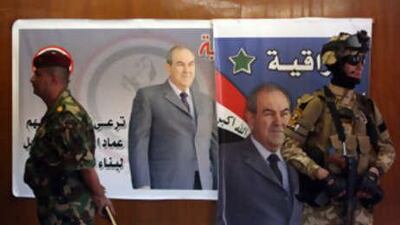BAGHDAD // On paper and in speeches at least, the United States formally ends its seven-and-a-half-year combat mission in Iraq at midnight tonight. George W Bush's Operation Iraqi Freedom will be over and Barack Obama's Operation New Dawn will begin.
For Iraqis, it may not be easy to tell the difference. Militarily, and especially politically, Iraq remains in a twilight zone, neither completely sovereign nor completely occupied. Although the last US combat brigade crossed into neighbouring Kuwait 12 days ago, 50,000 US soldiers will stay in Iraq another year. Without apparent irony, Gen Stephen Lanza, a US military spokesman, describes them as "combat troops on a non-combat mission".
This "non-combat" designation, however, is belied by the armoured US military vehicles that conduct patrols without Iraqi escorts. It is also contradicted by the unilateral military operations that the US forces are still carrying out in Mosul, in the north, and elsewhere in Iraq, under the rubric of "force protection" or rooting out improvised explosive devices. President Obama, who will mark tonight's milestone with a televised address, said at the weekend that the withdrawal of US combat troops from Iraq means "the war is ending" and Baghdad is in a position "to chart its own course". Yet most Iraqis assume that tens of thousands of US contractors, even soldiers, will remain in their country for many years to come, shaping its future.
Where the US presence in Iraq remains even more pervasive, however, is in the country's politics. Efforts to form a government have dragged on since March, when parliamentary elections ended in a virtual tie between Ayad Allawi's Iraqiyya list and the State of Law coalition of the prime minister, Nouri al Maliki. Mr Obama wanted a government agreed upon by Ramadan. The Americans describe themselves as "facilitators" in the political process, even though they worry about "losing our leverage", a phrase heard often from diplomatic, intelligence and military officials at the US Embassy.
As the political crisis continues, rumours swirl that Washington is backing Mr al Maliki. That suggestion causes US diplomatic and military officials to bristle. There are severe limits to what the US government can and should do, especially since Iraq is a democratic government, insisted James Jeffrey, the US ambassador to Baghdad. "We have no real power or authority here," Mr Jeffrey said in a briefing last week. "We have no right to interject ourselves in any kind of threatening way."
Mr Jeffrey said the United States is not "picking winners and losers", merely supporting a process that will result, and soon, in an effective and inclusive government. Still, Washington has preferences. A chief one is to ensure that a new government has more Sunni leaders than any of its predecessors in the post-Saddam Hussein era. To accomplish this, it wants a prominent place in the new Iraqi administration for Mr Allawi, who currently lacks sufficient support among key parliamentary blocs to be prime minister but is a proven bridge-builder.
"We would like to see an important role for Allawi," Mr Jeffrey said, acknowledging that the former member of the Baath Party, although a Shiite, was able to break new political ground in post-invasion Iraq by winning the acceptance of the new order among the country's Sunnis and secular elite. According to sources participating in the negotiations, the most likely configuration for the new government is an Allawi presidency with increased powers combined with a Maliki premiership with a term limit and reduced powers.
Political reward is not the only factor spurring US efforts on behalf of Mr Allawi. The commander of US military forces in Iraq, Gen Raymond Odierno, is worried about a renewed insurgency if Mr Allawi's Iraqiyya list is not satisfied, according to officers close to the general. As tonight's milestone approaches, US officials here seem nervous and impatient. They worry that the pro-Iranian followers of Moqtada al Sadr, the populist, anti-occupation Shiite cleric, might end up playing a critical role in the new government. That would be unacceptable, Mr Jeffrey said:
"We would really have to ask whether we can have much of a future in this country given the Sadrists' political position. They like to be part of the political process and threaten to blow up the political process. Their whole world view and whole vision of relations with the US is incompatible with any relationship we could have." For Washington, much is at stake in the outcome of negotiations to form a new government. It has an extensive agenda in mind for Iraq, including integrating it into its regional alliances and persuading Sunni-dominated governments in the region to welcome Iraq into the fold.
"A strong democratic Iraq will bring stability to the Middle East, and if we see an Iraq that's moving toward that two, three, five years from now, I think we can call our operations a success," Gen Odierno said this week. For that success, it needs an amenable, if not a friendly, Iraqi government and an extension of the Status of Forces Agreement, which set the deadline for the withdrawal of US forces from Iraq by the end of 2011.
Unless that administration is formed soon, the hard-won accomplishments in Iraq that Washington are touting could be for naught. "You don't want to test the hypothesis that this society can endure without a government and with leaders preoccupied with government formation," Mr Jeffrey warned. "It's not a comfortable scenario. We don't feel comfortable about this. Every day that goes by increases the risk that something bad will happen. This is not a stable environment and it's not an environment where our powers of prediction over the past five years have been impressive."
@Email:foreign.desk@thenational.ae

